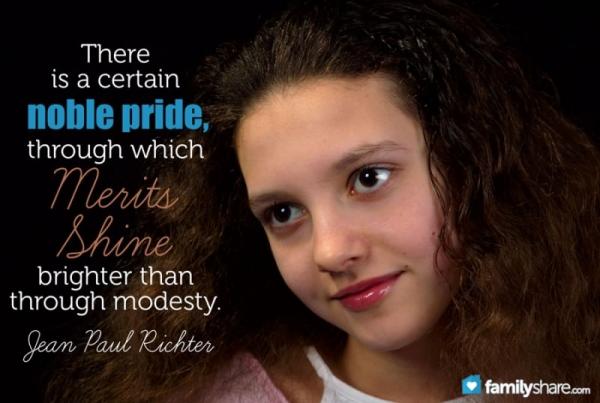
Everywhere we look are surrounded by immodesty, not only in dress, but in behavior and speech. Stores are filled with inappropriate clothing for our little ones. Our kids hear off-color jokes and language at school. Many kids may try to mirror their pop-culture idols who seem to set the standards that kids want to follow. Modesty involves living simply, not calling attention to oneself, exercising moderation in all things, and just being decent.
Being immersed in a culture that embraces the lack of virtue, how do we bring our children up to think, dress, speak and behave modestly?
Start teaching modesty at birth
It has to start from the day your child is born. It is so easy to pick out cute little tiny bikinis and halter tops and short shorts. But then when do you ask them to change? At age 4? At age 6? At age 12? It's so much easier to bring them up wearing modest clothing and making it their norm. Shopping is a perfect time to talk about modesty and self-respect and the sacredness of their little bodies. I remember speaking to my first daughter. I was worried and taught her about trying not to be vulgar. She would look at the store manequins and say, "That's bulgert, isn't it?" She couldn't even pronounce the word yet, but she knew what it meant.
Modesty is about more than dressing appropriately
Our bodies and our minds are gifts from God. We have to do our best to bring them home to him in as much of a state of purity as possible. We need to be so careful about what goes into those little minds of our children. What they see, hear and learn stays with them and affects the decisions and choices they make. Until they are old enough to be discerning and make those choices, we need to act as filters and buffers, monitoring with vigilance the programs, music and other media we allow in our homes.
Open a dialog with your children
Children mimic what they see and hear. If we begin to see those sorts of behaviors creeping into our children's behavior, speech or dress, that is not the time to blow a gasket. I learned the hard way that panic-mode is not effective. Rather, we need to welcome the opportunity to have a meaningful, well thought out dialogue with our children and explain to them how their actions, speech and thoughts will be affected by this sort of thing.
Be the example
We need to show our children by example how to live modestly. Children find it challenging to understand when they are being taught things that are contrary to what they see and hear. If we dress modestly, they will be more inclined to accept our teachings. If our speech is modest (free of profanity, derogation and slander), they are more likely to speak kindly and modestly as well. If we exemplify the sacredness of our bodies and minds and use them for good, they will follow.
Be pro-active
Having deep and meaningful discussions with our children about things they may encounter before they actually encounter them will help them prepare to say 'no' when the time arises. The dinner table is a great setting for discussions. We can bring up scenarios and discuss them. "What would you do if ... ?" "How would you react if ... ?" Then we need to listen to their responses and discuss them openly, with gentle guidance - not disparaging judgment.
Take advantage of every opportunity to teach
When we are with our children out in public and witness things that are contrary to the values we want them to have, we should take the opportunity to discuss them. If we see someone dressed scantilly, we can later ask them about their thoughts. "How do you think the way she dressed reflected how she felt about herself?" If we enocourage our children to think rather than react, they are more likely to be thoughtful about their own choices.
Living a modest life means more stability, more freedom and a lot less drama and heartache. This is a solid foundation for living and we owe it to our children to bring them up with the virtue of modesty. In the long run, if we do, they are more likely to choose a mate with the same values and rear good families of their own. Who could ask for anything better than that?

